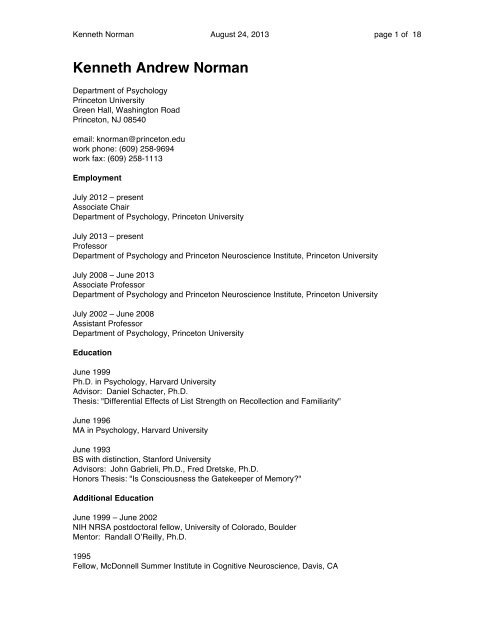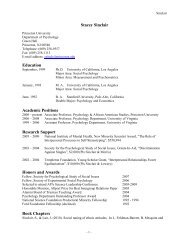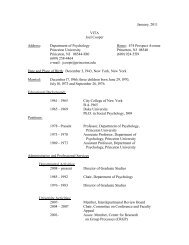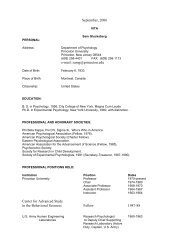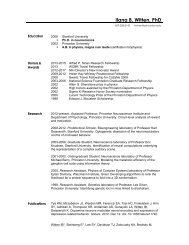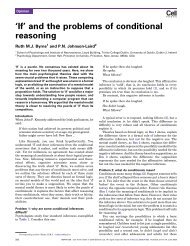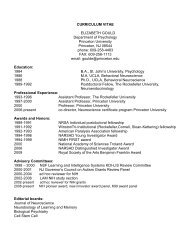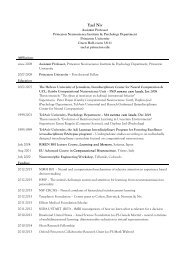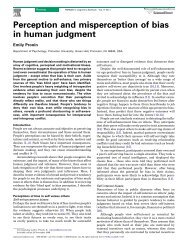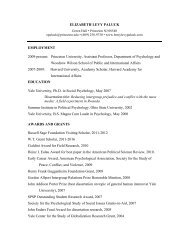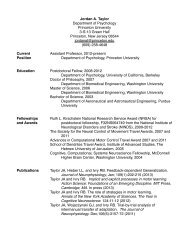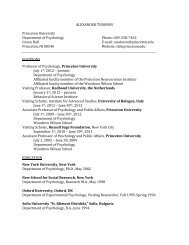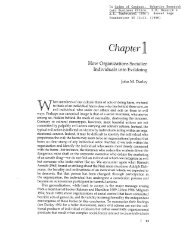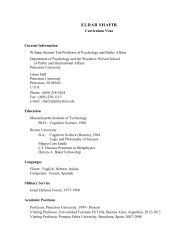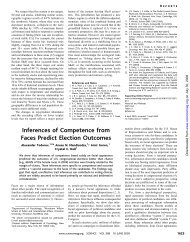Kenneth Andrew Norman - Department of Psychology - Princeton ...
Kenneth Andrew Norman - Department of Psychology - Princeton ...
Kenneth Andrew Norman - Department of Psychology - Princeton ...
Create successful ePaper yourself
Turn your PDF publications into a flip-book with our unique Google optimized e-Paper software.
<strong>Kenneth</strong> <strong>Norman</strong> August 24, 2013 page 1 <strong>of</strong> 18<br />
<strong>Kenneth</strong> <strong>Andrew</strong> <strong>Norman</strong><br />
<strong>Department</strong> <strong>of</strong> <strong>Psychology</strong><br />
<strong>Princeton</strong> University<br />
Green Hall, Washington Road<br />
<strong>Princeton</strong>, NJ 08540<br />
email: knorman@princeton.edu<br />
work phone: (609) 258-9694<br />
work fax: (609) 258-1113<br />
Employment<br />
July 2012 – present<br />
Associate Chair<br />
<strong>Department</strong> <strong>of</strong> <strong>Psychology</strong>, <strong>Princeton</strong> University<br />
July 2013 – present<br />
Pr<strong>of</strong>essor<br />
<strong>Department</strong> <strong>of</strong> <strong>Psychology</strong> and <strong>Princeton</strong> Neuroscience Institute, <strong>Princeton</strong> University<br />
July 2008 – June 2013<br />
Associate Pr<strong>of</strong>essor<br />
<strong>Department</strong> <strong>of</strong> <strong>Psychology</strong> and <strong>Princeton</strong> Neuroscience Institute, <strong>Princeton</strong> University<br />
July 2002 – June 2008<br />
Assistant Pr<strong>of</strong>essor<br />
<strong>Department</strong> <strong>of</strong> <strong>Psychology</strong>, <strong>Princeton</strong> University<br />
Education<br />
June 1999<br />
Ph.D. in <strong>Psychology</strong>, Harvard University<br />
Advisor: Daniel Schacter, Ph.D.<br />
Thesis: "Differential Effects <strong>of</strong> List Strength on Recollection and Familiarity"<br />
June 1996<br />
MA in <strong>Psychology</strong>, Harvard University<br />
June 1993<br />
BS with distinction, Stanford University<br />
Advisors: John Gabrieli, Ph.D., Fred Dretske, Ph.D.<br />
Honors Thesis: "Is Consciousness the Gatekeeper <strong>of</strong> Memory"<br />
Additional Education<br />
June 1999 – June 2002<br />
NIH NRSA postdoctoral fellow, University <strong>of</strong> Colorado, Boulder<br />
Mentor: Randall O’Reilly, Ph.D.<br />
1995<br />
Fellow, McDonnell Summer Institute in Cognitive Neuroscience, Davis, CA
<strong>Kenneth</strong> <strong>Norman</strong> August 24, 2013 page 2 <strong>of</strong> 18<br />
Research Interests<br />
Using computational models to explore the neural basis <strong>of</strong> learning and memory<br />
Testing the predictions <strong>of</strong> these models, using behavioral and neuroimaging measures<br />
Developing multivariate methods for extracting information about cognitive states from<br />
neuroimaging data<br />
Fellowships and Awards<br />
Thomas A. Wasow Visiting Scholar, Stanford University, January 2014<br />
<strong>Princeton</strong> Engineering Commendation List for Outstanding Teaching, 2011<br />
President’s Award for Distinguished Teaching, <strong>Princeton</strong> University, 2007<br />
Lawrence S. Brodie University Preceptorship, <strong>Princeton</strong> University, 2006-2009<br />
NIH NRSA Postdoctoral Fellowship, "Hippocampal and Neocortical Contributions to<br />
Recognition", Grant MH12582-01, February, 2000 to June, 2002<br />
Harvard University Graduate Society Fellowship, 1998<br />
Sackler Scholarship in Psychobiology, Harvard University, 1996-1998<br />
National Defense Science & Engineering Fellowship, 1993-1996<br />
National Science Foundation Graduate Fellowship (awarded), 1993<br />
Grants: Active<br />
The John Templeton Foundation, Proposal ID 36751, “Toward a scientific understanding <strong>of</strong> the<br />
human capacity for cognitive control”, $1,127,000 annual direct costs, J. Cohen, PI, 08/01/12 –<br />
07/31/15<br />
This project involves the construction <strong>of</strong> formal theoretical models and empirical tests <strong>of</strong> these<br />
models in behavioral and neuroimaging experiments studying higher-level forms <strong>of</strong> cognitive<br />
control. I am co-PI on two sub-projects (relating to prospective memory and development <strong>of</strong><br />
advanced multivariate pattern analysis methods).<br />
NSF IIS-1009542, “Text, neuroimaging, and memory: Unified models <strong>of</strong> corpora and cognition”,<br />
D. Blei and K. <strong>Norman</strong>, co-PIs, 3 years, $166,000 annual direct costs, 8/01/10 – 7/31/13<br />
The goal <strong>of</strong> this research is to develop new machine learning algorithms that can infer (based on<br />
fMRI data, behavioral memory data, and text corpus statistics) how a person’s mental state<br />
evolves as they encode and retrieve memories.<br />
NIH 2R01 MH069456, “Computational, neural, and behavioral studies <strong>of</strong> competition-dependent<br />
learning”, K. <strong>Norman</strong>, PI, 5 years, $250,000 annual direct costs, 8/07/09 – 5/31/14<br />
The goal <strong>of</strong> this research is to further develop neural network models <strong>of</strong> how the brain implements<br />
competition-dependent learning, and to test these models by running fMRI and EEG memory
<strong>Kenneth</strong> <strong>Norman</strong> August 24, 2013 page 3 <strong>of</strong> 18<br />
experiments.<br />
NSF BCS-1229597, “MRI: Acquisition <strong>of</strong> high performance compute cluster for multivariate realtime<br />
and whole-brain correlation analysis <strong>of</strong> fMRI data”, J. Cohen, PI, 3 years $527,978 direct<br />
costs, 8/15/12 – 7/31/15<br />
This grant funded the purchase <strong>of</strong> a computer cluster to support real-time multivariate pattern<br />
analysis <strong>of</strong> fMRI data and also multivariate decoding <strong>of</strong> cognitive state information from functional<br />
connectivity data. I am a co-PI on this grant.<br />
<strong>Princeton</strong> University, J. Insley Blair Pyne fund and Essig-Enright fund, “Integrating new<br />
information with existing knowledge in human decision making”, K. <strong>Norman</strong> and R. Schapire, co-<br />
PIs, 2 years, $35,000 annual direct costs, 6/23/12 – 6/22/14<br />
The goal <strong>of</strong> this research is examine how periods <strong>of</strong> <strong>of</strong>fline processing (such as sleep or quiet<br />
rest) affect reward-based decision making. To achieve this goal, we will develop a formal theory<br />
within a reinforcement-learning (RL) framework and we will test that theory using a newly<br />
developed decision-making task in humans.<br />
NIH T32 MH065214,, “NRSA training grant in quantitative neuroscience”, K. <strong>Norman</strong> and J.<br />
Cohen, co-PIs, 5 years, $475,000 annual direct costs, 8/01/13 – 7/31/18<br />
This grant is a renewal <strong>of</strong> <strong>Princeton</strong>’s existing graduate & postdoctoral training program in<br />
quantitative and computational neuroscience.<br />
Grants: Completed<br />
NSF IIS-1146294, “CRCNS 2011 PI meeting at <strong>Princeton</strong> University”, K. <strong>Norman</strong>, PI, 1 year,<br />
$23,300 direct costs, 10/1/11 – 9/30/12<br />
This grant funded the annual PI meeting for the NSF/NIH Collaborative Research in<br />
Computational Neuroscience program, which was held in <strong>Princeton</strong> in October 2011.<br />
NIH R01 MH075706, “Analysis <strong>of</strong> Multi-Voxel Patterns <strong>of</strong> Activity in fMRI Data”,<br />
J. Haxby, PI, 5 years, $225,000 annual direct costs, 9/18/06 – 5/31/12<br />
The goal <strong>of</strong> this research was to develop and refine multivariate methods for analyzing spatially<br />
distributed patterns <strong>of</strong> fMRI activity (e.g., applying pattern classifiers to fMRI data to read out the<br />
information represented in the subject’s brain). I was a co-investigator on this grant.<br />
NIH P50 MH062196, Project 3, “Dynamics <strong>of</strong> Decision Making and Control in Memory Retrieval”,<br />
M. Kahana, PI, 5 years, $250,000 annual direct costs, 9/21/05 – 8/31/11 (no-cost extension)<br />
The goal <strong>of</strong> this research was to use new neuroimaging analysis methods, applied to fMRI and<br />
EEG data, to test computational models <strong>of</strong> how top-down control interacts with the accumulation<br />
<strong>of</strong> evidence during memory retrieval. I was a co-investigator on this grant.<br />
NIH R01 MH069456-01, “Modeling the Neural Basis <strong>of</strong> Episodic Memory”, K. <strong>Norman</strong>, PI, 5<br />
years, $200,000 annual direct costs, 2/01/04 – 1/31/09<br />
The goal <strong>of</strong> this research was to further develop computational models <strong>of</strong> how hippocampus and<br />
perirhinal cortex contribute to recognition memory, and to test the predictions <strong>of</strong> these models by<br />
conducting memory experiments on normal and brain-damaged populations.
<strong>Kenneth</strong> <strong>Norman</strong> August 24, 2013 page 4 <strong>of</strong> 18<br />
NIH R01 MH052864, “Functional MRI and Modeling Studies <strong>of</strong> Prefrontal Cortex”, J. Cohen, PI, 5<br />
years, $250,000 annual direct costs, 9/25/03 – 6/30/08<br />
The goal <strong>of</strong> this research was to use functional MRI and computational modeling to explore how<br />
hippocampus and prefrontal cortex interact during task switching paradigms. I was a coinvestigator<br />
on this grant.<br />
Publications<br />
Research Papers (In Preparation / Submitted / Under Review)<br />
deBettencourt, M. T., Cohen, J. D., Lee, R. F., <strong>Norman</strong>, K. A., & Turk-Browne, N. B. (in<br />
preparation). Closed-loop training <strong>of</strong> attention with real-time brain imaging.<br />
Davis. T., LaRocque, K. F., Mumford, J., <strong>Norman</strong>, K. A., Wagner, A. D., & Poldrack, R. A. (in<br />
preparation). What do differences between multi-voxel and univariate analyses mean How<br />
subject-, spatial-, and trial-level variance impact fMRI analyses.<br />
Gershman, S. J., Jones, C. E., <strong>Norman</strong>, K. A., Monfils, M.-H., & Niv, Y. (under review). Gradual<br />
extinction prevents the return <strong>of</strong> fear. Frontiers in Behavioral Neuroscience.<br />
Gershman, S. J., Monfils, M.-H., <strong>Norman</strong>, K. A., & Niv, Y. (in preparation). The computational<br />
nature <strong>of</strong> memory reconsolidation.<br />
Gershman, S. J., Radulescu, A., <strong>Norman</strong>, K. A., & Niv, Y. (under review). Statistical computations<br />
underlying the dynamics <strong>of</strong> memory updating. PLoS Computational Biology.<br />
Hulbert, J. C. & <strong>Norman</strong>, K. A. (in preparation). Alternating study and retrieval practice leads to<br />
differentiation <strong>of</strong> competing memories.<br />
Kim, G., Lewis-Peacock, J. A., <strong>Norman</strong>, K. A., & Turk-Browne, N. B. (submitted). Pruning <strong>of</strong><br />
memories due to context-based prediction error.<br />
Lewis-Peacock, J. A., Cohen, J. D., & <strong>Norman</strong>, K. A. (in preparation). Neural evidence for the<br />
flexible use <strong>of</strong> working memory and episodic memory in prospective remembering.<br />
Lewis-Peacock, J. A. & <strong>Norman</strong>, K. A. (under revision). Lingering activation <strong>of</strong> previous items in<br />
working memory leads to forgetting. Nature Neuroscience.<br />
Manning, J. R., Ranganath, R., <strong>Norman</strong>, K. A., & Blei, D. M. (in preparation). Topographic factor<br />
analysis: matrix factorization with spatial constraints.<br />
Poppenk, J, & <strong>Norman</strong>, K. A. (in preparation). Partial memory retrieval leads to inhibition <strong>of</strong><br />
cortical memory representations.<br />
Research Papers (In Press / Published)<br />
Gershman, S. J., Schapiro, A. C., Hupbach, A., & <strong>Norman</strong>, K. A. (2013). Neural context<br />
reinstatement predicts memory misattribution. Journal <strong>of</strong> Neuroscience<br />
Detre, G. J., Natarajan, A., Gershman, S. J., and <strong>Norman</strong>, K. A. (2013). Moderate levels <strong>of</strong><br />
activation lead to forgetting in the think/no-think paradigm. Neuropsychologia.
<strong>Kenneth</strong> <strong>Norman</strong> August 24, 2013 page 5 <strong>of</strong> 18<br />
Johnson, M. R., Higgins, J. A., <strong>Norman</strong>, K. A., Sederberg, P. B., Smith, T. A., & Johnson, M. K.<br />
(2013). Foraging for thought: an inhibition-<strong>of</strong>-return-like effect resulting from directing attention<br />
within working memory. Psychological Science.<br />
Poppenk, J. & <strong>Norman</strong>, K. A. (2012). Mechanisms supporting superior source memory for familiar<br />
items: A multi-voxel pattern analysis study. Neuropsychologia.<br />
Gershman, S. J., Moore, C. D., Todd, M. T., <strong>Norman</strong>, K. A., & Sederberg, P. B. (2012). The<br />
successor representation and temporal context. Neural Computation, 24, 1553-1568.<br />
Sederberg, P. B., Gershman, S. J., Polyn, S. M., and <strong>Norman</strong>, K. A. (2011). Human memory<br />
reconsolidation can be explained using the Temporal Context Model. Psychonomic Bulletin and<br />
Review, 18, 455-468.<br />
Gershman, S. J., Blei, D. M., Pereira, F., & <strong>Norman</strong>, K. A. (2011). A topographic latent source<br />
model for fMRI data. Neuroimage, 57, 89-100.<br />
<strong>Norman</strong>, K. A. (2010). How hippocampus and cortex contribute to recognition memory: Revisiting<br />
the Complementary Learning Systems model. Hippocampus, 20, 1217-1227.<br />
Quamme, J. R., Weiss, D. J., & <strong>Norman</strong>, K. A. (2010). Listening for recollection: A multi-voxel<br />
pattern analysis <strong>of</strong> recognition memory retrieval strategies. Frontiers in Human Neuroscience.<br />
doi: 10.3389/fnhum.2010.00061.<br />
Newman, E. L., & <strong>Norman</strong>, K. A. (2010). Moderate excitation leads to weakening <strong>of</strong> perceptual<br />
representations. Cerebral Cortex. doi: 10.1093/cercor/bhq021.<br />
Said, C. P., Moore, C. D., <strong>Norman</strong>, K. A., Haxby, J. V., & Todorov, A. (2010). Graded<br />
representations <strong>of</strong> emotional expressions in the left superior temporal sulcus. Frontiers in<br />
Systems Neuroscience. doi: 10.3389/fnsys.2010.00006.<br />
Johnson, J. D., McDuff, S. G. R., Rugg, M. D., & <strong>Norman</strong>, K. A. (2009). Recollection, familiarity,<br />
and cortical reinstatement: A multivoxel pattern analysis. Neuron, 63, 697-708.<br />
McDuff, S. G. R., Frankel, H. C., & <strong>Norman</strong>, K. A. (2009). Multivoxel pattern analysis reveals<br />
increased memory targeting and reduced use <strong>of</strong> retrieved details during single-agenda source<br />
monitoring. Journal <strong>of</strong> Neuroscience, 29, 508-516.<br />
Migo, E., Montaldi, D., <strong>Norman</strong>, K. A., Quamme, J. R., and Mayes, A. R. (2009). The contribution<br />
<strong>of</strong> familiarity to recognition memory is a function <strong>of</strong> test format when using similar foils. Quarterly<br />
Journal <strong>of</strong> Experimental <strong>Psychology</strong>, 62, 1198-1215.<br />
Polyn, S. M., <strong>Norman</strong>, K. A., & Kahana, M. J. (2009). A context maintenance and retrieval model<br />
<strong>of</strong> organizational processes in free recall. Psychological Review, 116, 129-156.<br />
Polyn, S. M., <strong>Norman</strong>, K. A., & Kahana, M. J. (2009). Task context and organization in free recall.<br />
Neuropsychologia, 47, 2158-63.<br />
Socher, R., Gershman, S. J., Perotte, A. J., Sederberg, P. B., Blei, D. M., & <strong>Norman</strong>, K. A. (2009).<br />
A Bayesian analysis <strong>of</strong> dynamics in free recall. Advances in Neural Information Processing<br />
Systems 22.
<strong>Kenneth</strong> <strong>Norman</strong> August 24, 2013 page 6 <strong>of</strong> 18<br />
<strong>Norman</strong>, K. A., Tepe, K., Nyhus, E. & Curran, T. (2008). Event-related potential correlates <strong>of</strong><br />
interference effects on recognition memory. Psychonomic Bulletin & Review, 15 (1), 36-43.<br />
<strong>Norman</strong>, K. A., Newman, E. L., & Detre, G. J. (2007). A neural network model <strong>of</strong> retrieval-induced<br />
forgetting. Psychological Review, 114, 887-953.<br />
Howard, M. W., Venkatadass, V., <strong>Norman</strong>, K. A., and Kahana, M. J. (2007). Associative<br />
processes in immediate recency. Memory & Cognition, 35, 1700-11.<br />
Quamme, J. R., Yonelinas, A. P., and <strong>Norman</strong>, K. A. (2007). The effect <strong>of</strong> unitization on<br />
associative recognition in amnesia. Hippocampus, 17, 192-200.<br />
<strong>Norman</strong>, K. A., Newman, E. L., Detre, G. J., & Polyn, S. M. (2006). How inhibitory oscillations<br />
can train neural networks and punish competitors. Neural Computation, 18, 1577-1610.<br />
Polyn, S. M., Natu, V. S., Cohen, J. D., & <strong>Norman</strong>, K. A (2005). Category-specific cortical activity<br />
precedes recall during memory search. Science, 310, 1963-1966.<br />
<strong>Norman</strong>, K. A., Newman, E. L., & Perotte, A. J. (2005). Methods for reducing interference in the<br />
complementary learning systems model: Oscillating inhibition and autonomous memory<br />
rehearsal. Neural Networks, 18, 1212-1228.<br />
Gonsalves, B. D., Kahn, I., Curran, T., <strong>Norman</strong>, K. A., & Wagner, A. D., (2005). Memory<br />
strength and repetition suppression: Multimodal imaging <strong>of</strong> medial temporal cortical contributions<br />
to recognition. Neuron, 47, 751-761.<br />
Atri, A., Sherman, S. J., <strong>Norman</strong>, K. A., Kirchh<strong>of</strong>f, B. A., Nicolas, M. M., Greicius, M. D., Cramer,<br />
S., Breiter, H.C., Hasselmo, M. E., & Stern, C. E. (2004). Blockade <strong>of</strong> central cholinergic<br />
receptors impairs new learning and increases proactive interference in a word paired-associate<br />
memory task. Behavioral Neuroscience, 118, 223-236.<br />
Mayes, A. R., Holdstock, J. S., Isaac, C. L., Montaldi, D., Grigor, J., Gummer, A., Cariga, P.,<br />
Downes, J. J., Tsivilis, D., Gaffan, D., Gong, Q., & <strong>Norman</strong>, K. A. (2004). Associative recognition<br />
in a patient with selective hippocampal lesions and relatively normal item recognition.<br />
Hippocampus, 14, 763-784.<br />
<strong>Norman</strong>, K. A. & O'Reilly, R. C. (2003). Modeling hippocampal and neocortical contributions to<br />
recognition memory: A complementary learning systems approach. Psychological Review, 110,<br />
611-646.<br />
<strong>Norman</strong>, K. A. (2002). Differential effects <strong>of</strong> list strength on recollection and familiarity. Journal <strong>of</strong><br />
Experimental <strong>Psychology</strong>: Learning, Memory, & Cognition, 28(6), 1083-1094.<br />
Holdstock, J. S., Mayes, A. R., Roberts, N., Cezayirli, E., Isaac, C. L., O'Reilly, R. C., & <strong>Norman</strong>,<br />
K. A. (2002). Under what conditions is recognition spared relative to recall after selective<br />
hippocampal damage in humans Hippocampus, 12, 341-351.<br />
O'Reilly, R. C., <strong>Norman</strong>, K. A., & McClelland, J. L. (1998). A hippocampal model <strong>of</strong> recognition<br />
memory. In M. I. Jordan, M. J. Kearns, & S. A. Solla (Eds.), Advances in Neural Information<br />
Processing Systems 10. Cambridge, MA: MIT Press.<br />
<strong>Norman</strong>, K. A., & Schacter, D. L. (1997). False recognition in younger and older adults: Exploring<br />
the characteristics <strong>of</strong> illusory memories. Memory & Cognition, 25, 838-848.
<strong>Kenneth</strong> <strong>Norman</strong> August 24, 2013 page 7 <strong>of</strong> 18<br />
Curran, T., Schacter, D. L., <strong>Norman</strong>, K. A., & Galluccio, L. (1997). False recognition after a right<br />
frontal lobe infarction: Memory for general and specific information. Neuropsychologia, 35, 1035-<br />
1049.<br />
Review Papers<br />
<strong>Norman</strong>, K. A., Polyn, S. M., Detre, G. J., & Haxby, J. V. (2006). Beyond mind-reading: Multivoxel<br />
pattern analysis <strong>of</strong> fMRI data. Trends in Cognitive Sciences, 10(9), 424-430<br />
<strong>Norman</strong>, K. A. (2006). Declarative memory: sleep protects new memories from interference.<br />
Current Biology, 16(15), R596-7.<br />
O’Reilly, R. C., & <strong>Norman</strong>, K. A. (2002). Hippocampal and neocortical contributions to memory:<br />
Advances in the complementary learning systems framework. Trends in Cognitive Sciences,<br />
6(12), 505-510.<br />
Schacter, D. L., <strong>Norman</strong>, K. A., & Koutstaal, W. (1998). The cognitive neuroscience <strong>of</strong><br />
constructive memory. Annual Review <strong>of</strong> <strong>Psychology</strong>, 49, 289-318.<br />
Schacter, D. L., Koutstaal, W., & <strong>Norman</strong>, K. A. (1997). False memories and aging. Trends in<br />
Cognitive Sciences, 1, 229-236.<br />
Schacter, D. L., Koutstaal, W., & <strong>Norman</strong>, K. A. (1996). Can cognitive neuroscience illuminate the<br />
nature <strong>of</strong> traumatic childhood memories Current Opinion in Neurobiology, 6, 207-214.<br />
Book Chapters<br />
Lewis-Peacock, J. A. & <strong>Norman</strong>, K. A. (in press). Multi-voxel pattern analysis. In M. Gazzaniga &<br />
R. Mangun, The Cognitive Neurosciences V. Cambridge, MA: MIT Press.<br />
Manning, J. R., <strong>Norman</strong>, K. A., & Kahana, M. J. (in press). The role <strong>of</strong> context in episodic<br />
memory. In M. Gazzaniga & R. Mangun, The Cognitive Neurosciences V. Cambridge, MA: MIT<br />
Press.<br />
Sederberg, P. B. & <strong>Norman</strong>, K. A. (2010). Learning and memory: Computational models. In. G.<br />
Koob, M. Le Moal, & R. Thompson (Eds.), Encyclopedia <strong>of</strong> Behavioral Neuroscience, Volume 2.<br />
Oxford: Academic Press (pp. 145-153).<br />
<strong>Norman</strong>, K. A., Quamme, J. R., & Newman, E. L. (2009). Multivariate methods for tracking<br />
cognitive states. In F. Roesler, C. Ranganath, B. Roder, & R. Kluwe (Eds.), Neuroimaging <strong>of</strong><br />
human memory: Linking cognitive process to neural systems. New York: Oxford University Press<br />
(pp. 299-330).<br />
<strong>Norman</strong>, K. A., Detre, G. J., & Polyn, S. M. (2008). Computational models <strong>of</strong> episodic memory. In<br />
R. Sun (Ed.), The Cambridge handbook <strong>of</strong> computational psychology. New York: Cambridge<br />
University Press.<br />
<strong>Norman</strong>, K. A. (2002). Computational models <strong>of</strong> episodic memory. In L. Nadel (Ed.),<br />
Encyclopedia <strong>of</strong> cognitive science. London: Macmillan.<br />
Schacter, D. L., <strong>Norman</strong>, K. A., & Koutstaal, W. (1997). The recovered memories debate: A<br />
cognitive neuroscience perspective. In M. A. Conway (Ed.), Recovered memories and false
<strong>Kenneth</strong> <strong>Norman</strong> August 24, 2013 page 8 <strong>of</strong> 18<br />
memories. New York: Oxford University Press.<br />
<strong>Norman</strong>, K. A., & Schacter, D. L. (1996). Implicit memory, explicit memory, and false recollection:<br />
A cognitive neuroscience perspective. In L. M. Reder (Ed.), Implicit memory and metacognition.<br />
Mahwah, NJ: Erlbaum.<br />
Conference Presentations<br />
Chan, S. C. Y., Applegate, M. C., Morton, N. W., Polyn, S. M., & <strong>Norman</strong>, K. A. (2013, May).<br />
Recall order is predicted by category-specific neural activity <strong>of</strong> preceding items at study. Poster<br />
presented at the Context and Episodic Memory Symposium, Philadelphia, PA.<br />
Hulbert, J. C. & <strong>Norman</strong>, K. A. (2013, May). Alternating study and retrieval practice leads to<br />
differentiation <strong>of</strong> competing memories. Poster presented at the Context and Episodic Memory<br />
Symposium, Philadelphia, PA.<br />
Lositsky, O., Toker, D., Chen, J., Honey, C., Hasson, U, & <strong>Norman</strong>, K. A. (2013, May). Time<br />
perception and contextual drift with a naturalistic stimulus. Poster presented at the Context and<br />
Episodic Memory Symposium, Philadelphia, PA.<br />
Manning, J. R., Blei, D. M., & <strong>Norman</strong>, K. A. (2013, May). A probabilistic temporal context model<br />
for tracking mental context using neural and behavioral data. Poster presented at the Context and<br />
Episodic Memory Symposium, Philadelphia, PA.<br />
Manning, J. R., Gershman, S. J., <strong>Norman</strong>, K. A., & Blei, D. M. (2012, December). Factor<br />
topographic latent source analysis: factor analysis for brain images. Poster presented at the<br />
Neural Information Processing Systems Conference, Workshop on Machine Learning and<br />
Interpretation in Neuroimaging, Lake Tahoe, NV.<br />
deBettencourt, M. T., Lee, R. F. , Cohen, J. D., <strong>Norman</strong>, K. A., & Turk-Browne, N. B. (2012,<br />
October). Decoding and training sustained attention with real-time fMRI. Poster presented at the<br />
Annual Meeting <strong>of</strong> the Society for Neuroscience, New Orleans, LA.<br />
Gershman, S. J., Schapiro, A. C., Hupbach, A., & <strong>Norman</strong>, K. A. (2012, October). Neural context<br />
reinstatement predicts memory misattribution.Poster presented at the Annual Meeting <strong>of</strong> the<br />
Society for Neuroscience, New Orleans, LA.<br />
Lewis-Peacock, J. A., Cohen, J. D., & <strong>Norman</strong>, K. A. (2012, October). Neural evidence for the<br />
flexible use <strong>of</strong> working memory and episodic memory in prospective remembering. Poster<br />
presented at the Annual Meeting <strong>of</strong> the Society for Neuroscience, New Orleans, LA.<br />
Lewis-Peacock, J. A. & <strong>Norman</strong>, K. A. (2012, October). Deactivation <strong>of</strong> items in working memory<br />
can weaken long-term memory. Talk presented at the Annual Meeting <strong>of</strong> the Society for<br />
Neuroscience, New Orleans, LA.<br />
Manning, J. R., Blei, D. M., & <strong>Norman</strong>, K. A. (2012, October). Decoding topic vectors during<br />
memory encoding and retrieval. Poster presented at the Annual Meeting <strong>of</strong> the Society for<br />
Neuroscience, New Orleans, LA.<br />
Poppenk, J. & <strong>Norman</strong>, K. A. (2012, October). Suppression <strong>of</strong> word-scene paired associate<br />
memories using an RSVP task. Poster presented at the Annual Meeting <strong>of</strong> the Society for<br />
Neuroscience, New Orleans, LA.
<strong>Kenneth</strong> <strong>Norman</strong> August 24, 2013 page 9 <strong>of</strong> 18<br />
Schapiro, A. C., <strong>Norman</strong>, K. A., & Rogers, T. T. (2012, October). The role <strong>of</strong> sleep in<br />
consolidating semantic knowledge. Poster presented at the Annual Meeting <strong>of</strong> the Society for<br />
Neuroscience, New Orleans, LA.<br />
Kim, G., Lewis-Peacock, J. A., <strong>Norman</strong>, K. A., & Turk-Browne, N. B. (2012, October). Contextbased<br />
prediction and memory suppression. Poster presented at the Annual Meeting <strong>of</strong> the<br />
Society for Neuroscience, New Orleans, LA.<br />
Schapiro, A. C., Trippe, A. M., Herd, S. A., O’Reilly, R. C., Rogers, T. T., & <strong>Norman</strong>, K. A. (2012,<br />
July). The computational mechanisms underlying learning during sleep. Poster presented at the<br />
Neural Computation and <strong>Psychology</strong> Workshop, San Sebastian, Spain.<br />
Lewis-Peacock, J.A. & <strong>Norman</strong>, K.A. (2012, May). Deactivation <strong>of</strong> items in working memory can<br />
weaken long-term memory. Poster presented at the Context and Episodic Memory Symposium,<br />
Bloomington, IN.<br />
Manning, J.R., Blei, D.M. & <strong>Norman</strong>, K.A. (2012, May). Tracking item representations during free<br />
recall. Poster presented at the Context and Episodic Memory Symposium, Bloomington, IN.<br />
Lewis-Peacock, J.A. & <strong>Norman</strong>, K.A. (2012, March). Deactivation <strong>of</strong> items in working memory can<br />
weaken long-term memory. Poster presented at the Cognitive Neuroscience Society meeting,<br />
Chicago, IL.<br />
Poppenk, J. & <strong>Norman</strong>, K.A. (2011, November). Familiarization helps contextual features stick to<br />
item features: A multi-voxel pattern analysis study. Poster presented at the Annual Meeting <strong>of</strong> the<br />
Society for Neuroscience, Washington, DC.<br />
Lewis-Peacock, J.A., Salesi, M.R., Cohen, J.D. & <strong>Norman</strong>, K.A. (2011, November). Decoding the<br />
use <strong>of</strong> working memory & episodic memory in prospective remembering. Poster presented at the<br />
Annual Meeting <strong>of</strong> the Society for Neuroscience, Washington, DC.<br />
Gershman, S. J., Blei, D. M., & <strong>Norman</strong>, K.A. (2011, October). New tools for decoding mental<br />
representations from neuroimaging data. Poster presented at the Collaborative Research in<br />
Computational Neuroscience Principal Investigators Meeting, <strong>Princeton</strong>, NJ.<br />
Detre, G.J., Natarajan, A., & <strong>Norman</strong>, K.A. (2010, November). Moderate memory activation leads<br />
to forgetting in the think-no think paradigm. Poster presented at the Annual Meeting <strong>of</strong> the Society<br />
for Neuroscience, San Diego, CA.<br />
Socher, R., Gershman, S. J., Perotte, A. J., Sederberg, P. B., Blei, D. M., & <strong>Norman</strong>, K. A. (2009,<br />
December). A Bayesian analysis <strong>of</strong> dynamics in free recall. Poster presented at the Neural<br />
Information Processing Systems conference, Vancouver, Canada.<br />
Saxe, A. & <strong>Norman</strong>, K. A. (2009, November). Stop-learning systems: Unifying levels <strong>of</strong><br />
abstraction in associative memory models. Poster presented at the Computational Cognitive<br />
Neuroscience conference, Boston, MA.<br />
McDuff, S.G.R., Frankel, H.C. & <strong>Norman</strong>, K.A. (2008, November). Multi-voxel pattern analysis<br />
reveals increased memory targeting and reduced use <strong>of</strong> retrieved details during single-agenda<br />
source monitoring. Poster presented at the Annual Meeting <strong>of</strong> the Society for Neuroscience,<br />
Washington, DC.<br />
Newman, E.L. & <strong>Norman</strong>, K.A. (2008, November). Weakening perceptual representations through
<strong>Kenneth</strong> <strong>Norman</strong> August 24, 2013 page 10 <strong>of</strong> 18<br />
moderate excitation. Poster presented at the Annual Meeting <strong>of</strong> the Society for Neuroscience,<br />
Washington, DC.<br />
Sederberg, P.B. & <strong>Norman</strong>, K.A. (2008, November). The dynamics <strong>of</strong> semantic and temporal<br />
cuing during episodic memory retrieval. Poster presented at the Annual Meeting <strong>of</strong> the<br />
Psychonomic Society, Chicago, IL.<br />
Quamme, J. R., Weiss, D. J., & <strong>Norman</strong>, K. A. (2008, April). Pattern classification <strong>of</strong> fMRI retrieval<br />
states in recognition memory. Poster presented at the Annual Meeting <strong>of</strong> the Cognitive<br />
Neuroscience Society, San Francisco, CA.<br />
Quamme, J. R., Weiss, D. J., & <strong>Norman</strong>, K. A. (2007, November). Pattern classification <strong>of</strong> fMRI<br />
retrieval states in recognition memory. Poster presented at the Annual Meeting <strong>of</strong> the<br />
Psychonomic Society, Long Beach, CA.<br />
Detre, G. J., Polyn, S. M., Bannert, M. M., & <strong>Norman</strong>, K. A. (2007, November). Context in free<br />
recall - multi-voxel pattern analysis <strong>of</strong> fMRI. Poster presented at the Annual Meeting <strong>of</strong> the<br />
Society for Neuroscience, San Diego, CA.<br />
Sederberg, P. B. & <strong>Norman</strong>, K. A. (2007, November). Tracking episodic and semantic retrieval<br />
with fMRI pattern classification. Poster presented at the Annual Meeting <strong>of</strong> the Society for<br />
Neuroscience, San Diego, CA.<br />
Newman, E. L. & <strong>Norman</strong>, K. A. (2007, November). Reading minds: Using EEG pattern<br />
classification to predict behavior in negative priming. Poster presented at the Annual Meeting <strong>of</strong><br />
the Society for Neuroscience, San Diego, CA.<br />
Newman, E. L. & <strong>Norman</strong>, K. A. (2007, May). Using EEG pattern classification to track<br />
competition in negative priming. Poster presented at the Annual Meeting <strong>of</strong> the Cognitive<br />
Neuroscience Society, New York, NY.<br />
Polyn, S. M., Morton, N. W., Kogen, D., <strong>Norman</strong> K. A., & Kahana, M. J. (2007, May). Task context<br />
and memory accessibility in free recall. Poster presented at the Annual Meeting <strong>of</strong> the Cognitive<br />
Neuroscience Society, New York, NY.<br />
Polyn, S. M., Morton, N. W., Kogen, D. K., <strong>Norman</strong>, K. A., & Kahana, M. J. (2006, November).<br />
Task effects on memory accessibility in free recall. Poster presented at the Annual Meeting <strong>of</strong> the<br />
Psychonomic Society, Houston, TX.<br />
Frankel, H. C., Robison, S. G., & <strong>Norman</strong>, K. A. (2006, October). fMRI correlates <strong>of</strong> retrieval<br />
orientation: Tracking contextual reinstatement using pattern classification. Poster presented at the<br />
Annual Meeting <strong>of</strong> the Society for Neuroscience, Atlanta GA.<br />
Newman, E. L. & <strong>Norman</strong>, K. A. (2006, October). Tracking the sub-trial dynamics <strong>of</strong> cognitive<br />
competition. Poster presented at the Annual Meeting <strong>of</strong> the Society for Neuroscience, Atlanta,<br />
GA.<br />
Polyn, S. M., <strong>Norman</strong>, K. A. , & Kahana, M. J. (2006, October). Tracking the stimulus<br />
representation in an fMRI study <strong>of</strong> free recall. Poster presented at the Annual Meeting <strong>of</strong> the<br />
Society for Neuroscience, Atlanta, GA<br />
Quamme, J. R. & <strong>Norman</strong>, K. A. (2006, October). Using fMRI pattern classification <strong>of</strong> recollection<br />
and familiarity to predict false alarms in recognition memory. Poster presented at the Annual
<strong>Kenneth</strong> <strong>Norman</strong> August 24, 2013 page 11 <strong>of</strong> 18<br />
Meeting <strong>of</strong> the Society for Neuroscience, Atlanta, GA.<br />
Robison, S. G., Osherson, D. N., <strong>Norman</strong>, K. A. & Cohen, J. D. (2006, October). Pattern<br />
classification <strong>of</strong> attentional control states. Poster presented at the Annual Meeting <strong>of</strong> the Society<br />
for Neuroscience, Atlanta GA<br />
Polyn, S. M., <strong>Norman</strong>, K. A., & Kahana, M. J. (2006, July). Context and episode in a model <strong>of</strong><br />
human memory. Society for Mathematical <strong>Psychology</strong> Meeting, Vancouver, BC.<br />
Carroll, M. K., <strong>Norman</strong>, K. A., Haxby, J. V., & Schapire, R. E. (2006, June). Exploiting spatial<br />
information to improve fMRI pattern classification. Poster presented at the Annual Meeting <strong>of</strong> the<br />
Organization for Human Brain Mapping, Florence, Italy.<br />
Detre, G., Polyn, S. M., Moore, C. D., Natu, V. S., Singer, B. D., Cohen, J. D., Haxby, J. V., &<br />
<strong>Norman</strong>, K. A. (2006, June). The Multi-Voxel Pattern Analysis (MVPA) toolbox. Poster presented<br />
at the Annual Meeting <strong>of</strong> the Organization for Human Brain Mapping, Florence, Italy.<br />
Detre, G., Natu, V. S., Schneider, K., DeSimone, K., Kastner, S., & <strong>Norman</strong>, K. A. (2005,<br />
November). Reading out the location being stored in spatial working memory with fMRI. Poster<br />
presented at the Annual Meeting <strong>of</strong> the Society for Neuroscience, Washington, DC.<br />
Quamme, J. R., Yonelinas, A. P., & <strong>Norman</strong>, K. A. (2005, November) Associative recognition in<br />
amnesia: spared performance is related to unitization and familiarity capacity. Poster presented at<br />
the Annual Meeting <strong>of</strong> the Society for Neuroscience, Washington, DC.<br />
Robison, S. G. & <strong>Norman</strong>, K. A. (2005, November). Pattern classification <strong>of</strong> memory encoding<br />
tasks. Poster presented at the Annual Meeting <strong>of</strong> the Society for Neuroscience, Washington DC.<br />
Polyn, S., Detre, G., Takerkart, S., Natu, V., Benharrosh, M., Singer, B., Cohen, J., Haxby, J., &<br />
<strong>Norman</strong>, K. A. (2005, June). A Matlab-based toolbox to facilitate multi-voxel pattern classification<br />
<strong>of</strong> fMRI data. Poster presented at the Annual Meeting <strong>of</strong> the Organization for Human Brain<br />
Mapping, Toronto, Canada.<br />
Lenartowicz, A., Detre, G., Polyn, S., Chein, J., Yeung, N., Nystrom, L., <strong>Norman</strong>, K. A., & Cohen,<br />
J. D. (2005, April). Characterization <strong>of</strong> brain states during task-switching using a neural network<br />
classifier. Poster presented at the Annual Meeting <strong>of</strong> the Cognitive Neuroscience Society, New<br />
York, NY.<br />
<strong>Norman</strong>, K. A., Newman, E., & Detre, G. (2004, November). Further predictions from a neural<br />
network model <strong>of</strong> retrieval induced forgetting. Poster presented at the 45th Annual Meeting <strong>of</strong> the<br />
Psychonomic Society, Minneapolis, MN.<br />
Polyn, S. M., Cohen, J., & <strong>Norman</strong>, K. A. (2004, October). Detecting distributed patterns in an<br />
fMRI study <strong>of</strong> free recall. Poster presented at the Annual Meeting <strong>of</strong> the Society for Neuroscience,<br />
San Diego, CA.<br />
Polyn, S. M., Nystrom, L. E., <strong>Norman</strong>, K. A., Haxby, J. V., Gobbini, M. I., & Cohen, J. D. (2004,<br />
June). Using neural network algorithms to investigate distributed patterns <strong>of</strong> brain activity in fMRI.<br />
Poster presented at the Annual Meeting <strong>of</strong> the Organization for Human Brain Mapping, Budapest,<br />
Hungary.<br />
<strong>Norman</strong>, K. A., Newman, E. L., Detre, G. J., & Polyn, S. M. (2004, April). How inhibitory<br />
oscillations can train neural networks and punish competitors. Poster presented at the Annual
<strong>Kenneth</strong> <strong>Norman</strong> August 24, 2013 page 12 <strong>of</strong> 18<br />
Meeting <strong>of</strong> the Cognitive Neuroscience Society, San Francisco, CA.<br />
<strong>Norman</strong>, K. A., Newman, E. L., Detre, G. J., & Polyn, S. M. (2004, March). How inhibitory<br />
oscillations can train neural networks and punish competitors. Poster presented at the<br />
Computational and Systems Neuroscience Meeting, Cold Spring Harbor, NY.<br />
Newman, E. L. & <strong>Norman</strong>, K. A. (2003, November) Oscillations drive learning in retrieval induced<br />
forgetting. Poster presented at the Annual Meeting <strong>of</strong> the Society for Neuroscience, New<br />
Orleans, LA.<br />
Polyn, S. M., <strong>Norman</strong>, K. A., & Cohen, J. D. (2003, March). Modeling prefrontal and medial<br />
temporal contributions to episodic memory. Poster presented at the Annual Meeting <strong>of</strong> the<br />
Cognitive Neuroscience Society, New York, NY.<br />
Newman, E. L. & <strong>Norman</strong>, K.A. (2003, April). A neural network model <strong>of</strong> retrieval induced<br />
forgetting. Poster presented at the Annual Meeting <strong>of</strong> the Cognitive Neuroscience Society, New<br />
York, NY.<br />
Polyn, S. M., <strong>Norman</strong>, K. A., & Cohen, J. D. (2002, November). Connectionist modeling <strong>of</strong> source<br />
memory phenomena. Poster presented at the Annual Meeting <strong>of</strong> the Society for Neuroscience,<br />
Orlando, FL.<br />
<strong>Norman</strong>, K. A., Curran, T., & Tepe, K. (2002, April). Event-related potential correlates <strong>of</strong><br />
interference effects on recognition memory. Poster presented at the Annual Meeting <strong>of</strong> the<br />
Cognitive Neuroscience Society, San Francisco, CA.<br />
<strong>Norman</strong>, K. A. (2000, November). Differential effects <strong>of</strong> list strength on recollection and familiarity.<br />
Poster presented at the Annual Meeting <strong>of</strong> the Psychonomic Society, New Orleans, LA.<br />
Kirchh<strong>of</strong>f, B. A., <strong>Norman</strong>, K. A., Nicolas, M. M., Greicius, M., Breiter, H. C., Hasselmo, M. E., &<br />
Stern, C. E. (2000, November). Effect <strong>of</strong> cholinergic blockade on paired-associate learning in<br />
humans. Poster presented at the Annual Meeting <strong>of</strong> the Society for Neuroscience, New Orleans,<br />
LA.<br />
Huber, D. E., O'Reilly, R. C., & <strong>Norman</strong>, K. A. (2000, May). Understanding memory strengthening<br />
in a model <strong>of</strong> neocortex: The deepening and sharpening <strong>of</strong> item attractors. Poster presented at<br />
the Fourth International Conference on Cognitive and Neural Systems, Boston University, Boston,<br />
Massachusetts.<br />
<strong>Norman</strong>, K. A., O'Reilly, R. C., & Huber, D. E. (2000, April). Modeling hippocampal and<br />
neocortical contributions to recognition memory. Poster presented at the Annual Meeting <strong>of</strong> the<br />
Cognitive Neuroscience Society, San Francisco, CA.<br />
Savage, C. R., Schacter, D. L., <strong>Norman</strong>, K. A., Fisler, R. E., Rauch, S. L., Benson R. L., & Albert,<br />
M. S. (1997, March). A functional MRI study <strong>of</strong> episodic memory retrieval. Poster presented at the<br />
Annual Meeting <strong>of</strong> the Cognitive Neuroscience Society, Boston, MA.<br />
Current Graduate and Postdoctoral Supervision<br />
Ph.D. advisor, Anna Schapiro, 8/2009 – present<br />
Ph.D. advisor, Megan deBettencourt, 6/2011 – present<br />
Ph.D. advisor, Stephanie Chan, 8/2011 – present<br />
Ph.D. advisor, Olga Lositsky, 8/2012 – present
<strong>Kenneth</strong> <strong>Norman</strong> August 24, 2013 page 13 <strong>of</strong> 18<br />
secondary Ph.D. advisor, Ghootae Kim, 8/2011 – present<br />
postdoctoral supervisor, Jordan Poppenk, 9/2010 – present<br />
postdoctoral supervisor, Jeremy Manning, 8/2011 – present<br />
postdoctoral supervisor, Justin Hulbert, 9/2011 – present<br />
postdoctoral co-supervisor, Ida Momennejad, 6/2013 – present<br />
postdoctoral co-supervisor, Aaron Bornstein, 8/2013 – present<br />
Prior Graduate and Postdoctoral Supervision<br />
Greg Detre (graduated with Ph.D. in <strong>Psychology</strong>, 2010), founder <strong>of</strong> Memrise, Inc.<br />
(www.memrise.com)<br />
Sam Gershman (graduated with Ph.D. in <strong>Psychology</strong>, 2012), current postdoctoral fellow in the<br />
Tenenbaum lab at MIT<br />
Christopher D. Moore (graduated with Ph.D. in <strong>Psychology</strong>, 2010), currently working as an<br />
analyst at WorldQuant<br />
Susan McDuff (graduated with Ph.D. in <strong>Psychology</strong>, 2009), currently medical student at UCSD<br />
Ehren Newman (graduated with Ph.D. in <strong>Psychology</strong>, 2008), currently postdoctoral fellow in the<br />
Hasselmo lab at Boston University<br />
Jarrod Lewis-Peacock (postdoctoral advisee, 2010-2013), currently Assistant Pr<strong>of</strong>essor <strong>of</strong><br />
<strong>Psychology</strong> at the University <strong>of</strong> Texas, Austin<br />
Sean Polyn (graduated with Ph.D. in <strong>Psychology</strong>, 2005), currently Assistant Pr<strong>of</strong>essor <strong>of</strong><br />
<strong>Psychology</strong> at Vanderbilt University<br />
Joel Quamme (postdoctoral advisee, 2004-2008), currently Assistant Pr<strong>of</strong>essor <strong>of</strong> <strong>Psychology</strong> at<br />
Grand Valley State University<br />
Per Sederberg (postdoctoral advisee, 2006-2010), currently Assistant Pr<strong>of</strong>essor <strong>of</strong> <strong>Psychology</strong> at<br />
the Ohio State University<br />
Pr<strong>of</strong>essional Membership<br />
American Psychological Society<br />
Cognitive Neuroscience Society<br />
Memory Disorders Research Society<br />
Psychonomic Society<br />
Society for Neuroscience<br />
Reviewing<br />
Editorial Board member, Psychonomic Bulletin & Review, 2005 - present<br />
Ad-hoc reviewer for:<br />
Army Research Office<br />
Behavioral and Brain Sciences<br />
Biological Psychiatry
<strong>Kenneth</strong> <strong>Norman</strong> August 24, 2013 page 14 <strong>of</strong> 18<br />
Brain Research<br />
Cerebral Cortex<br />
Cognition<br />
Cognitive, Affective, & Behavioral Neuroscience<br />
Cognitive Neuropsychology<br />
Cognitive Science<br />
Current Biology<br />
Developmental <strong>Psychology</strong><br />
Frontiers in Human Neuroscience<br />
Hippocampus<br />
Journal <strong>of</strong> Cognitive Neuroscience<br />
Journal <strong>of</strong> Experimental <strong>Psychology</strong>: General<br />
Journal <strong>of</strong> Experimental <strong>Psychology</strong>: Learning, Memory, & Cognition<br />
Journal <strong>of</strong> Gerontology: Psychological Sciences<br />
Journal <strong>of</strong> Memory & Language<br />
Journal <strong>of</strong> Neuroscience<br />
Learning & Memory<br />
Medical Research Council, UK<br />
Memory & Cognition<br />
National Science Foundation<br />
Nature Neuroscience<br />
Network: Computation in Neural Systems<br />
Neural Information Processing Systems Conference<br />
Neuroimage<br />
Neuron<br />
Neuroscience Letters<br />
Neuropsychologia<br />
PLoS Biology<br />
PLoS One<br />
PNAS<br />
Psychological Review<br />
Psychological Science<br />
<strong>Psychology</strong> & Aging<br />
Science<br />
Wellcome Trust<br />
Pr<strong>of</strong>essional Activities<br />
Co-organizer (with William Bialek), Collaborative Research in Computational Neuroscience<br />
(CRCNS) Principal Investigators meeting, October, 2011, <strong>Princeton</strong>, NJ<br />
Member, NIH CP grant review panel, July 2011 – June 2017<br />
Ad-hoc panelist, NIH CP grant review panel, June 2010<br />
Panelist, NSF Perception, Action, and Cognition panel (three times)<br />
Editor, special issue <strong>of</strong> Neuropsychologia on Multivariate Pattern Analysis and Cognitive Theories<br />
(published in March, 2012).<br />
Member, Faculty <strong>of</strong> 1000 Biology, Theoretical Neuroscience section, July 2008 – December 2009<br />
Organizer, Symposium on Computational Models <strong>of</strong> Memory, Memory Disorders Research
<strong>Kenneth</strong> <strong>Norman</strong> August 24, 2013 page 15 <strong>of</strong> 18<br />
Society, Chapel Hill, NC, October, 2009<br />
Member, Computational Cognitive Neuroscience Conference organizing committee, January<br />
2008 – present<br />
Member, Context and Episodic Memory Symposium organizing committee, October 2008 –<br />
present<br />
Panelist, NIH special emphasis grant review panels BBBP-E (January 2011), BBBP-E (November<br />
2010), BBBP-D (June 2009), BBBP-L (March 2009)<br />
Member, NIH ZRG1 F02A (20) study section (Neuroscience predoctoral & postdoctoral<br />
fellowships), March 2004 – June 2004<br />
Co-organizer (with Michael Kahana), Second Annual Episodic Memory Symposium, New<br />
Orleans, LA, November 2003<br />
Co-organizer (with Michael Kahana), First Annual Episodic Memory Symposium, Orlando, FL,<br />
November 2002<br />
Consultant on NIH R01 grant, Tim Curran PI, “ERP studies <strong>of</strong> dual processes in human<br />
recognition memory”, January 2002 – December 2006<br />
Co-organizer (with Ken Malmberg), Symposium on New Approaches to Dual-Process Models <strong>of</strong><br />
Recognition, Annual Interdisciplinary Conference, Jackson, WY, January 2001<br />
Teaching<br />
Spring 2004-05, Fall 2005-06, Fall 2007-08, Spring 2009-10, Fall 2011-12: PSY 306, “Memory<br />
and Cognition”<br />
This course provides an integrative treatment <strong>of</strong> learning and memory in humans and animals.<br />
We explore working memory (our ability to actively maintain thoughts in the face <strong>of</strong> distraction)<br />
and episodic memory (our ability to rapidly memorize specific details so we can recall them later),<br />
as well as more incremental forms <strong>of</strong> learning. In studying these topics, we consider the<br />
behavioral paradigms used to extract learning and memory data, as well as techniques from<br />
cognitive neuroscience (e.g., neuroimaging, lesion studies, computational modeling) that shed<br />
light on how the brain gives rise to learning and memory.<br />
Fall 2003-04: FRS 165, “Memory Distortion and Forgetting”<br />
This freshman seminar course provides an introduction to the neural basis <strong>of</strong> memory, and then<br />
applies this knowledge to the (closely related) problems <strong>of</strong> why we fail to remember things that<br />
happened and why we sometimes remember things that did not happen.<br />
Spring 2002-03, Spring 2003-04, Spring 2005-06, Spring 2007-08, Spring 2008-09, Spring 2011-<br />
12: PSY 330, “Introduction to Connectionist Models: Bridging Between Brain and Mind”<br />
This course provides an introduction to the use <strong>of</strong> connectionist models (also known as neural<br />
network or parallel distributed processing models) as a tool for exploring how psychological<br />
functions are implemented in the brain. The goal <strong>of</strong> this course is to give students the theoretical<br />
background and practical skills that they will need to pursue further independent research in<br />
computational modeling <strong>of</strong> cognition.
<strong>Kenneth</strong> <strong>Norman</strong> August 24, 2013 page 16 <strong>of</strong> 18<br />
Spring 2010-11, Spring 2012-13: ELE/NEU/PSY 480, “fMRI Decoding: Reading Minds Using<br />
Brain Scans”<br />
This course (co-taught with Peter Ramadge in Electrical Engineering) teaches students how to<br />
use sophisticated pattern-classification algorithms, applied to patterns <strong>of</strong> functional MRI data, to<br />
decode the information that is represented in the subject's brain at a particular point in time. In<br />
lectures, students learn about cutting-edge techniques for finding meaningful patterns in large,<br />
noisy datasets; in weekly computer labs, students use these techniques to gain insight into fMRI<br />
datasets.<br />
Spring 2009-10, Spring 2010-11, Spring 2011-12, Spring 2012-13: NEU 502, “Neuroscience:<br />
From Molecules to Systems to Behavior”<br />
This class is the Spring-semester portion <strong>of</strong> the year-long proseminar for Neuroscience Ph.D.<br />
students. I assist with teaching modules on neural networks and fMRI, and I teach a two-weeklong<br />
module on memory.<br />
Fall 2011-12: Junior Paper Laboratory, “Sleep and Memory”<br />
This course provides hands-on experience in experimental design, experiment programming,<br />
participant testing, and data analysis, with the goal <strong>of</strong> preparing <strong>Psychology</strong> juniors to carry out<br />
their senior thesis experiments. Students learned about the effects <strong>of</strong> sleep on memory, decided<br />
on a specific research topic (looking at the role <strong>of</strong> sleep in updating existing knowledge structures<br />
based on new information), and learned how to program experiments in Psychtoolbox; each<br />
student came up with their own variant <strong>of</strong> the same “core” experiment, ran at least 8 participants,<br />
and analyzed the data from these participants.<br />
Other Research Activities<br />
Faculty sponsor <strong>of</strong> <strong>Princeton</strong> Experience Based Cognition (EBC) team. Supervised crossdepartmental<br />
team <strong>of</strong> researchers (from <strong>Psychology</strong>, Physics, Computer Science, Applied Math,<br />
and Electrical Engineering) who participated in the Pittsburgh Brain Activity Interpretation<br />
Competition in 2006 and 2007. The goal <strong>of</strong> the competition was to predict subjects’ cognitive state<br />
from functional MRI data acquired while they were watching a movie (in 2006) and while they<br />
were playing a virtual reality video game (in 2007). In both 2006 and 2007, the <strong>Princeton</strong> team<br />
won second prize overall, and had three entries in the top ten. For more information on the<br />
competition see: http://www.braincompetition.org<br />
University and <strong>Department</strong>al Service<br />
Member, Committee on Undergraduate Admission and Financial Aid, September 2011 – present<br />
Director, Quantitative and Computational Neuroscience Training, <strong>Princeton</strong> Neuroscience Institute<br />
Ph.D. program, 2012 – present<br />
Member, <strong>Princeton</strong> Neuroscience Institute graduate admissions committee, 2011– present<br />
Member, <strong>Princeton</strong> Neuroscience Institute curriculum committee, 2012 – present<br />
Advisory board member, Keller Center for Innovation in Engineering Education, <strong>Princeton</strong><br />
University, 2008 – present
<strong>Kenneth</strong> <strong>Norman</strong> August 24, 2013 page 17 <strong>of</strong> 18<br />
Chair, Cognitive <strong>Psychology</strong> faculty search committee, 2011-2012<br />
Member, <strong>Princeton</strong> Neuroscience Institute faculty search committee, 2011-2012<br />
Member, <strong>Princeton</strong> Experimental Research Committee, <strong>Department</strong> <strong>of</strong> <strong>Psychology</strong> (this<br />
committee oversees the undergraduate subject pool), 2005 – 2012<br />
Freshman & sophomore advisor, Wilson College, 2003-04 academic year<br />
Invited Talks<br />
Mind, Brain, Behavior Symposium, Harvard University, September 2013<br />
NIMH Summer Institute in Cognitive Neuroscience, Squaw Valley, CA, July 2013<br />
<strong>Psychology</strong> <strong>Department</strong> Colloquium, UCSD, May 2013<br />
NIMH Summer Institute in Cognitive Neuroscience, UC Santa Barbara, July 2012<br />
<strong>Psychology</strong> <strong>Department</strong> Colloquium, Stanford University, June 2012<br />
Tsukuba International Conference on Memory, Tokyo, Japan, March 2012<br />
Yale Magnetic Resonance Research Center, Yale University, January 2012<br />
Conference on Executive Function, University <strong>of</strong> Colorado at Boulder, January 2012<br />
Advanced fMRI Educational Session, OHBM Conference, Quebec City, Canada, June 2011<br />
Rotman Research Institute Rounds, Baycrest Hospital, Toronto, Canada, January 2011<br />
Chaucer Club Symposium, MRC-CBU, Cambridge, UK, December, 2010<br />
Recognition Memory Symposium, University <strong>of</strong> Bristol, Bristol, UK, July 2010<br />
<strong>Psychology</strong> <strong>Department</strong> Colloquium, Brown University, May, 2010<br />
Cognition and Perception Seminar, New York University, March, 2010<br />
Center for the Neural Basis <strong>of</strong> Cognition Colloquium, Carnegie Mellon University, January, 2010<br />
Symposium on fMRI and Source Memory, Psychonomic Society meeting, Boston, MA,<br />
November, 2009<br />
Brain and Cognition Seminar, University <strong>of</strong> Illinois Urbana-Champaign, April, 2009<br />
Neuroscience Institute Seminar, <strong>Princeton</strong> University, December, 2008<br />
IPAM summer school on Mathematics in Brain Imaging, Los Angeles, CA, July 2008<br />
Symposium on Neuroethics, Society for Philosophy and <strong>Psychology</strong> meeting, Philadelphia, PA,<br />
June 2008
<strong>Kenneth</strong> <strong>Norman</strong> August 24, 2013 page 18 <strong>of</strong> 18<br />
Psychological and Brain Sciences Colloquium, Johns Hopkins University, March 2008<br />
Symposium on Context and Episodic Memory, Tampa, FL, January 2008<br />
Symposium on Computationally-Based Brain Imaging, Computational Cognitive Neuroscience<br />
conference, San Diego, CA, November 2007<br />
Conference on Neuroimaging and Theories <strong>of</strong> Memory, Marburg, Germany, August 2006<br />
Merck Summer Institute for the Study <strong>of</strong> Developmental Disabilities, June 2006<br />
Episodic Memory Symposium, Computational Cognitive Neuroscience conference, Washington<br />
DC, November 2005<br />
Institute for Research in Cognitive Science Colloquium, University <strong>of</strong> Pennsylvania, October 2005<br />
Workshop on Computational Modeling <strong>of</strong> Inhibitory Processes, Arlington, TX, March 2005<br />
Behavior, Brain, & Cognition Colloquium, Washington University in St. Louis, December 2004<br />
Liverpool Memory Symposium, Liverpool, UK, June 2004<br />
NACS Colloquium, University <strong>of</strong> Maryland, March 2004<br />
Cognitive Lunch, Yale University, March 2004<br />
<strong>Department</strong>al Colloquium, Rutgers-Newark, October 2003<br />
Center for Cognitive Neuroscience Colloquium, University <strong>of</strong> Pennsylvania, December 2002<br />
Taught a neural network workshop at the Merck Summer Institute for the Study <strong>of</strong> Developmental<br />
Disabilities, July 2003<br />
Personal Information<br />
Date <strong>of</strong> Birth: October 15, 1971<br />
Citizenship: USA


